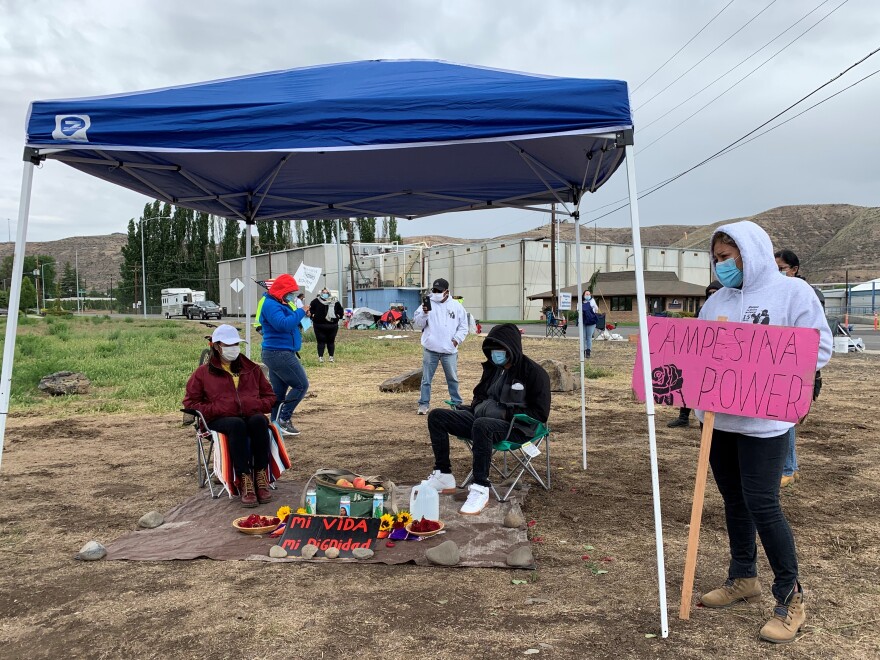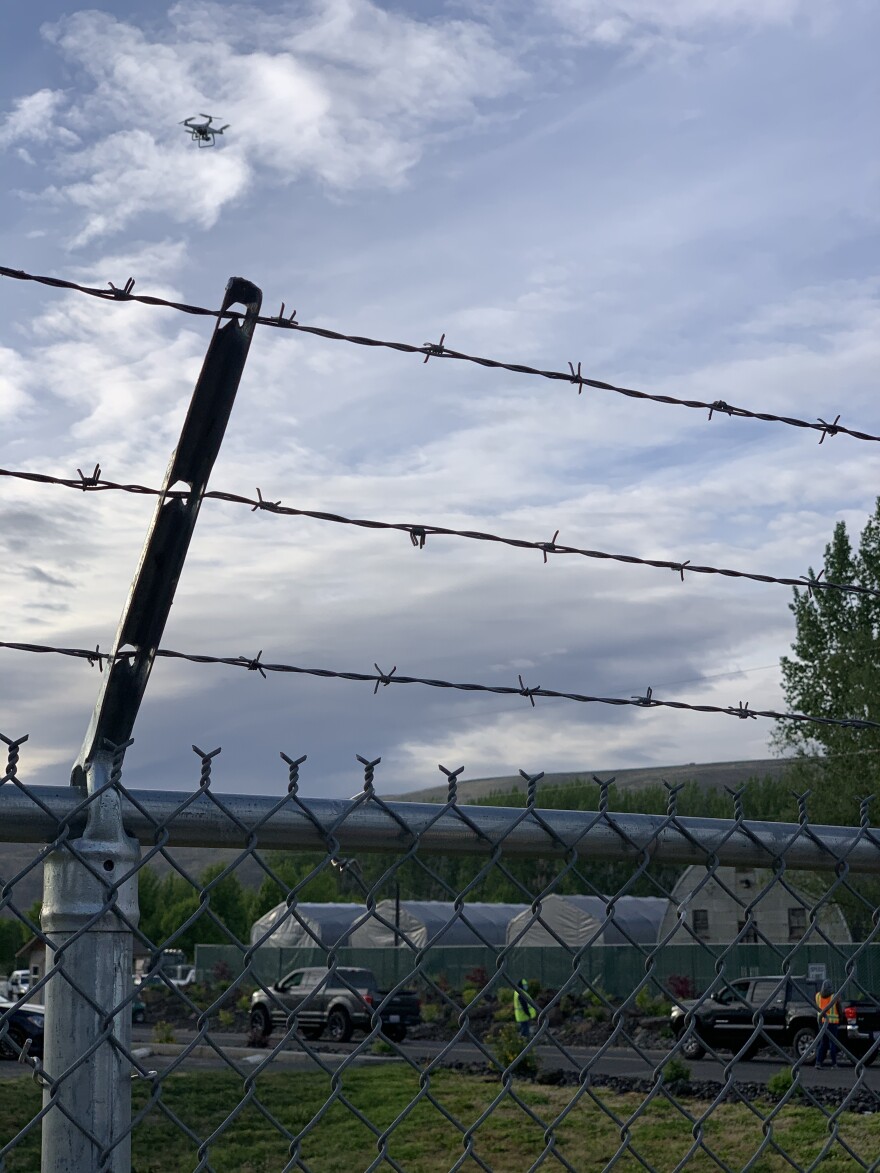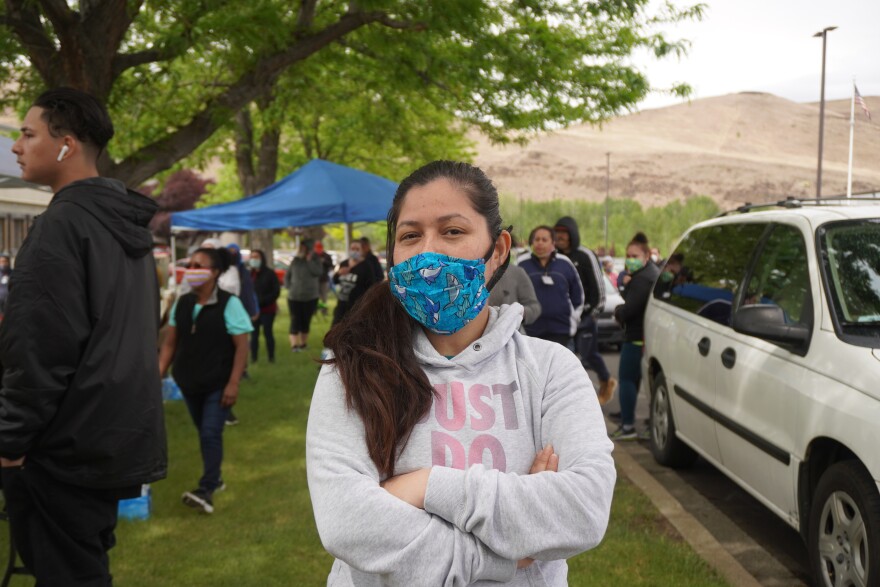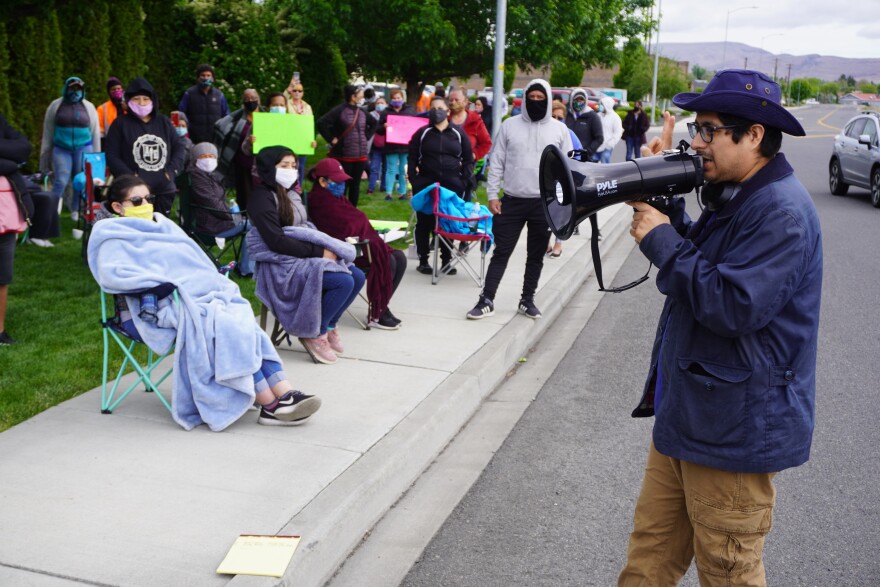Listen
Just as the sun rises over the Yakima Valley on May 14, more than 100 workers drive their vehicles off Monson Fruit property in Selah, north of Yakima. They’re walking off the job because they’re angry and afraid.
Striking Monson workers say they were told by management that at least seven employees have tested positive for COVID-19 and they worry their employer isn’t doing enough to protect them.
“Nosotros claro que queremos trabajar. Necesitamos el trabajo. Por eso estamos aqui. Pero queremos condiciones laborales bien.”
“Of course we want to work,” says one worker who declined to share her name for fear of retribution. “We need the work. That’s why we’re here. But we want good work conditions.”
WATCH: Yakima Fruit Workers Strike, Seeking More Protections
(Story continues below video)
Of the more than 2,600 people infected with coronavirus in the county, about 15% are agriculture and food production workers, according to the Yakima Health District.
It’s tough for workers to choose between an income and fighting for protections. But they say their lives may depend on it.
“Nos acaban de decir que si no queremos trabajar aqui nos vayamos. Nos estan amenasando que vamos a perder el trabajo.”
“They just told us that if we don’t want to work here to leave,” the worker says. “They’re threatening us that we’re going to lose our jobs.”
ALSO SEE: Coronavirus News, Resources, Updates From NWPB
Even with the threat of retribution on their mind, employees walked off production lines, believing it best for their family’s health.
“Nosotros podemos llevar el virus. Por eso necesitamos un plan que nos de esa seguridad de salir a trabajar, de trabajar seguros y de regresar a casa y estar bien”
“We could take the virus [home],” says Marilu Aguayo, a packer. Aguayo lives with her nephew, who also works at Monson Fruit, his wife and their six children. “That’s why we need a plan that gives us security to go to work, work safely, and return home and be okay.”
As Monson Fruit workers walk outside, a drone flies close by, about 20 feet above the ground, its camera pointed at the strike. Workers point out company officials taking photos from afar.
“Lo que siempre ha pasado aqui es esta situacion, siempre esta la amenaza por parte de los supervisores, si no haces lo que ellos dicen, siempre te dicen ‘ahi esta la puerta.’”
Monson Fruit officials didn’t respond to multiple requests to speak by phone or in person for this story. General manager Jason Bakker wrote in an email that drones are used by the company to monitor and photograph horticulture and construction projects. He says that practice has stopped until the strike is resolved to prevent the perception of intimidation.
“Monson Fruit respects our employees’ right to strike, and there has not been and will not be any retaliation to those employees not working,” Bakker wrote.
Workers felt otherwise.
“There’s always been that threat from supervisors, that if you don’t do what they ask they say ‘there’s the door,’” Aguayo said. “‘No one is indispensable and if you leave now, I’ll replace you.’”
Not The Only Company
So far this month, more than 400 Yakima Valley fruit packing workers have gone on strike, according to Familias Unidas Por La Justicia (FUJ). The farmworker advocacy group, based in Skagit County, is helping these workers organize committees, negotiate with employers and seek legal advice.
Monson Fruit isn’t the only company with striking employees. Employees from companies Matson, Hansen, Columbia Reach, Allan Brothers, and Jack Frost have also gone on strike. Workers at Roche Fruit and Brandt and Sons also walked out for a day recently, according to FUJ.
Striking workers say they want more masks, gloves, disinfectant, plastic dividers between workers on the production line, and a $2 per hour increase in pay. Workers throughout the various company strikes echo those demands.
Workers have also demanded that their employers inform them who exactly tested positive so they can know if they may have been exposed. Company managers say that by law they can’t give out private health information of employees.
“If we’re looking to have a healthy, productive economy, it depends on a healthy and viable workforce,” says Edgar Franks, political director for FUJ. “And if there is nothing being done to protect these workers, it has the potential to crash the whole economy, along with causing a health crisis.”
Last month, Familias Unidas Por La Justicia and United Farm Workers sued Washington state and its departments of Health and of Labor & Industries over safety guidelines they say are unenforceable and don’t go far enough to protect farmworkers.
The Department of Labor & Industries released emergency rules on May 13 for farmworker housing, outlining the safe use of bunk beds for example. As of May 21, the department has not released rules for workers in packing lines.
$5 For A Mask
A day before Monson workers demonstrated, workers at Jack Frost Fruit also went on strike.
Among them was Perla Torres, who packs apples at Jack Frost. She says workers have received masks, but supervisors aren’t replacing them daily.
“They have given out masks but there have been times when we didn’t get any,” Torres said. “There was a week we didn’t have gloves or towels to dry our hands or disinfectant.”
On one occasion, Torres accidentally dropped her mask on the ground when she was on break. She picked it up and went to her car to have lunch. Some workers say they’ve started eating in their cars to avoid crowded lunch tables.
Torres had used the mask for three days, so when she came back to work, she hoped to get a new one, but a supervisor declined.
“It wasn’t my fault it fell,” Torres said. “She should have given me another one. After three days with that mask, I shouldn’t have to use that one.”
Torres says she was told to get the mask out of her car and reuse it. Her other option was to buy a mask from a supervisor for $5 dollars. That angered many workers.
“We had to buy masks when they should have supplied them,” Torres said.
Masks were also sold at Matson Fruit in Selah according to striking workers like Maria Hernandez, who said masks were sold for $3 dollars each and were made with cheap cloth, with no filter.
“Yo te voy a ser sincera, aqui nada es justo. Las mascarillas supestamente las tienen que dar, no vender. Estamos trabajando, se supone que el dueño tiene que darte las cosas.”
“I’ll be sincere with you. Nothing is just here,” Hernandez said. “Masks should be provided, not sold. We’re at work, the owners should provide these things.”
Striking Matson workers also demanded more plastic dividers between workers on the production line. Veronica Granillo described the dividers that have been installed as improvised frames made of PVC piping covered with layers of a thin industrial plastic wrap.
“They’ve installed plastic but not professional-grade plastic,” Granillo said. “It’s like the wrap you use in your kitchen to cover fruit. And the production line is run so fast that we’re forced to bunch up, so what they’ve installed is useless when they themselves put people at risk.”
Matson Fruit did not respond to a request for an interview. But in statements to the press, manager Jordan Matson wrote on May 14 that the company has acquired “enough cloth masks to give every member of our team one free of charge” and has started issuing face shields to workers since May 20.
The company has also reached out to the Yakima Health District for feedback on their measures to protect workers but has not heard back on possible areas of improvement, Matson wrote.
Brian Bruner is operations manager at Jack Frost. He says an employee — not the company — was selling homemade masks like the one Perla Torres described.
“At no time was anybody ever required to purchase them,” Bruner told NWPB in an interview. “That was totally up to their choice if they wanted to. If they did not want that, we were more than happy to give them one of ours.”
Bruner adds that Jack Frost is following and exceeding state guidelines for protecting workers on the production line but that masks are in short supply making replacing them daily difficult.
“Some of them have been used more than one day,” Brunner said. “We’ve got 120 people in the facility on the packing line on any given day and so we’re continuously watching our supply.”
Struggled To Get PPE
All of these companies have struggled to get enough personal protective equipment for employees, Jon DeVaney, president of the Washington State Tree Fruit Association, says. “It’s been a real challenge. A lot of employers have told me that they have two-month backorders of these products.”
Managers at Allan Brothers, Monson, and Jack Frost Fruit say they’ve had trouble acquiring masks but have distributed them to workers in varying degrees.
DeVaney says the Tree Fruit Association has brought the issue to the state, but the Washington health officials prioritize acquiring protective equipment for essential workers like first responders. Devaney says the state acquired 50,000 masks for agricultural workers in early May and expects more soon.
But the shortages of protective supplies now and the uncertainty of how long the pandemic will last leaves workers like Perla Torres in anguish.
“No me senti valorada ni nada de eso. Me senti que oh no le importamos, no le importo y no le importamos las personas.”
“I didn’t feel valued or anything,” she says. “I felt like ‘oh, we don’t matter to them, I don’t matter to them and people don’t matter to them.’”
Hazard Pay Stall
It’s unclear when workers will feel they can return to work safely and end the strikes. At Roche Fruit and Brandt and Sons, strikes ended within a day. At Allan Brothers, the first company where workers walked off the job, on May 7, employees say negotiations stalled May 13 over hazard.
The stall drove two workers, Cesar Gonzalez and Elvira Medina, a couple with three teenage daughters, to launch an hunger strike May 19. They’ve worked at Allan Brothers off and on for a year and are demanding a $2 dollar an hour increase in pay.
Most workers, even those who’ve worked at the company for decades, earn minimum wage, Medina says, and it’s tough work. It’s made tougher by the risk of bringing COVID-19 home.
“Si nosotros nos enfermamos, pues obvio tenemos miedo de contagiarlas, de que ellas se enfermen. Si a mi me llega a pasar algo, por ejemplo yo muero por el virus, mis hijas se quedan solas. Aparte, si yo no puedo trabajar, mi hija que esta estudiando porque yo quiero darle mejor futuro, su estidio seria troncado.”
“If we get sick, we’re obviously worried we’ll get them sick,” Medina says. “If something happens to me, if I die because of the virus, my daughters would end up alone. And if I can’t work, my eldest who’s in university because I want to give her a better future, her studies would be truncated.”
It’s a risk Medina says she and workers like her should be compensated for, in case they do get sick.
“Son las vidas de nosotros, no son las vidas de los jefes, no son las vidas del gobierno. Ellos estan en una silla sentados, nosotros estamos exponiendo nos.”
“These are our lives, not the lives of our bosses, not the lives of the government. They’re sitting in chairs, we’re here exposing ourselves,” Gonzalez adds with a booming, angry voice, despite his otherwise quiet demeanor.
The same day the hunger strike began, Allan Brothers workers on strike also filed an unfair labor practices complaint with the National Labor Relations Board. They allege the company has interrogated workers about their strike activity, threatened workers with discipline if they joined the strike, and used unlawful wage hikes for non-strikers in an effort to stop the strike, according to a May 21 press release from Columbia Legal Services.
ALSO SEE: Coronavirus News, Resources, Updates From NWPB
Allan Brothers did not respond to a request for comment on the hunger strike, but CEO Miles Kohl said in a May 11 interview that the company is looking to provide hazard pay and acquire protective equipment in a way that’s financially sustainable.
“Right now, it’s probably the worst apple market we’ve had in 10 or 12 years. Retailers are very concerned people aren’t going to buy cherries. We have a high degree of economic uncertainty as a company,” Kohl said.
Tree Fruit Association President DeVaney said an employer’s ability to provide hazard pay is dependent on their pay structure. But the entire industry is facing economic uncertainty. The focus of employers is on acquiring protective equipment and following safety procedures rigorously.
Pay and safety are important issues, but the two should not be conflated, he said.
“No one is made safer by getting more pay,” DeVaney said. “If it was employers saying ‘we think we have a safety issue, why don’t we just pay you a little more money to make that go away,’ people would be rightly outraged.”
Cesar Gonzalez, doing the hunger strike, says Allan Brothers is distributing face shields to people on the packaging line and offered employees a $1 dollar an hour increase for seven weeks. But the temporary increase is not enough when the pandemic is likely to last well beyond that, Gonzalez says.
“Si somos essenciales como la ley lo reconoce, porque no nos dan ese sueldo que estamos pidiendo. O a caso para ellos, la vida de nosotros no vale nada? Y sus manzanas valen mas que nosotors?”
“If we’re essential as recognized by law, why aren’t they giving us the pay we’re asking for? Or are our lives worth nothing to them? Are their apples worth more than our lives?”




